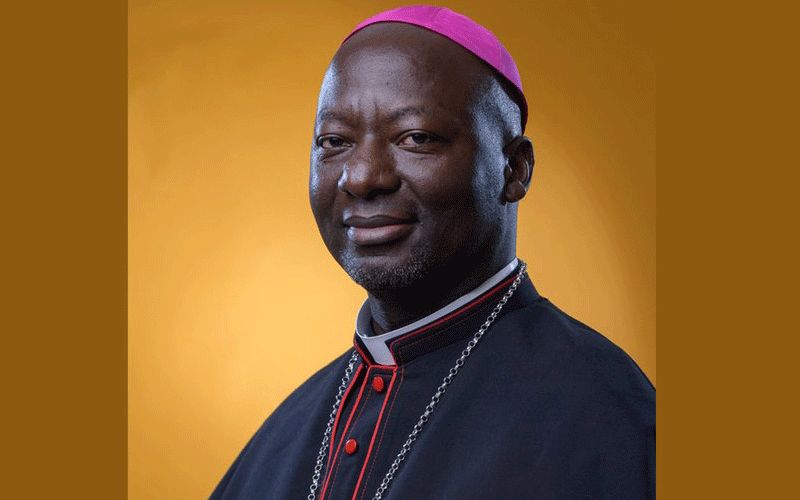“The idea of avoiding people who need me has never sat well with me. I always go whenever I hear someone has fallen sick, whether or not they are down with the virus. And because of this, not many people want to associate with me,” he says, adding that some religious communities started distancing themselves from him for fear that he would infect them with a presumed virus.
His 100 days as Bishop have also been marked by the loss of his close friend, a Priest who succumbed to kidney disease.
The Bishop narrated to ACI Africa how, during his preparation for the Episcopal Ordination following his appointment in 2019, he was busy with Fr. Boniface Kasali, who was extremely sick.
“I had planned to accompany him back home to DRC (the Democratic Republic of Congo) where he was to get a kidney donor. This was not possible due to the Visa processes. Fr. Boniface left by himself and within two weeks after he left, he died on Sunday, April 26 in his home Diocese of Butembu- Beni in DRC,” the Prelate said, adding that Fr. Boniface was hurriedly buried, a day after his demise.
He grieved for the Cleric who had stayed in South Africa from 2003 till 2020, laboring to master the local language and culture of the southern African country.
(Story continues below)
“As his Bishop and the Priests, with the people of Aliwal Diocese we shall miss him very much since one could count on him for any issues on pastoral work. He had a very good working relationship with the children, youth and the adults,” the Bishop condoled in a message that was published on the Southern African Catholic Bishops Conference (SACBC) website.
All the challenges notwithstanding, the new Bishop is one of the few Prelates in South Africa who had successfully implemented a pastoral plan before the pandemic struck and brought activities in the Church to an unceremonious halt.
Launched two weeks to the Bishop’s ordination in February, the new pastoral plan, “Evangelizing community, serving God, humanity & all creation” replaced the old pastoral Plan “Community Serving humanity” of 1986.
Expected to run for 10 years, the pastoral plan will be characterized with celebrations, study days by using the different Church documents, Bible, Diocesan policies, Code of Canon Law, discussions, workshops, prayers and pilgrimages.
The COVID-19 lockdown has been, to Bishop Joe, a moment of reflection, calling him “to look at the families with new eyes.”
“They (families) are the Church, what we call the domestic Church,” the Prelate says, adding that in his pastoral letters, he has encouraged members of families to take the Small Christian Community approach, where family members share roles in domestic worship.
“I have been encouraging that families take up the Priesthood of the Baptized. We are all Priests, baptized and sent and in such times, we are called upon to look deeply in our mission as Priests much as we are lay people, to conduct liturgy, to give each other blessings,” he says, and adds, “The buildings where we worship may be closed but the people, who are the real Church, are still present in their families.”
The Prelate who declares that he is not a fan of online Church proceedings says, “People don’t have to sit in front of screens to watch me yet I don’t see them. That is why I have always encouraged sending of reflection materials to guide them in their prayers as a family.”
Additionally, he says, people of God in his jurisdiction are poor women and children who cannot afford Internet and mobile devices.
Despite the hurdles, the expectations that the new Prelate had for the Church in South Africa where he has stayed since 1990 are still alive.
“What I envisioned on the day of my colorful ordination as Bishop was a journey with lay people and the poorest of the poor. It is a hope that is still alive in me despite all the storms that come my way,” he says, adding that he derives strength to soldier on from daily scriptures.
“The other day was the feast of St. Magdalene and I couldn’t help but reflect of the line, ‘Why are you weeping’ in the Gospel. Such words encourage me to take my cross every day and to follow Jesus who is weeping with us and with people who are going through unimaginable pain in their lives,” Bishop Joe Kizito tells ACI Africa.
Agnes Aineah is a Kenyan journalist with a background in digital and newspaper reporting. She holds a Master of Arts in Digital Journalism from the Aga Khan University, Graduate School of Media and Communications and a Bachelor's Degree in Linguistics, Media and Communications from Kenya's Moi University. Agnes currently serves as a journalist for ACI Africa.








